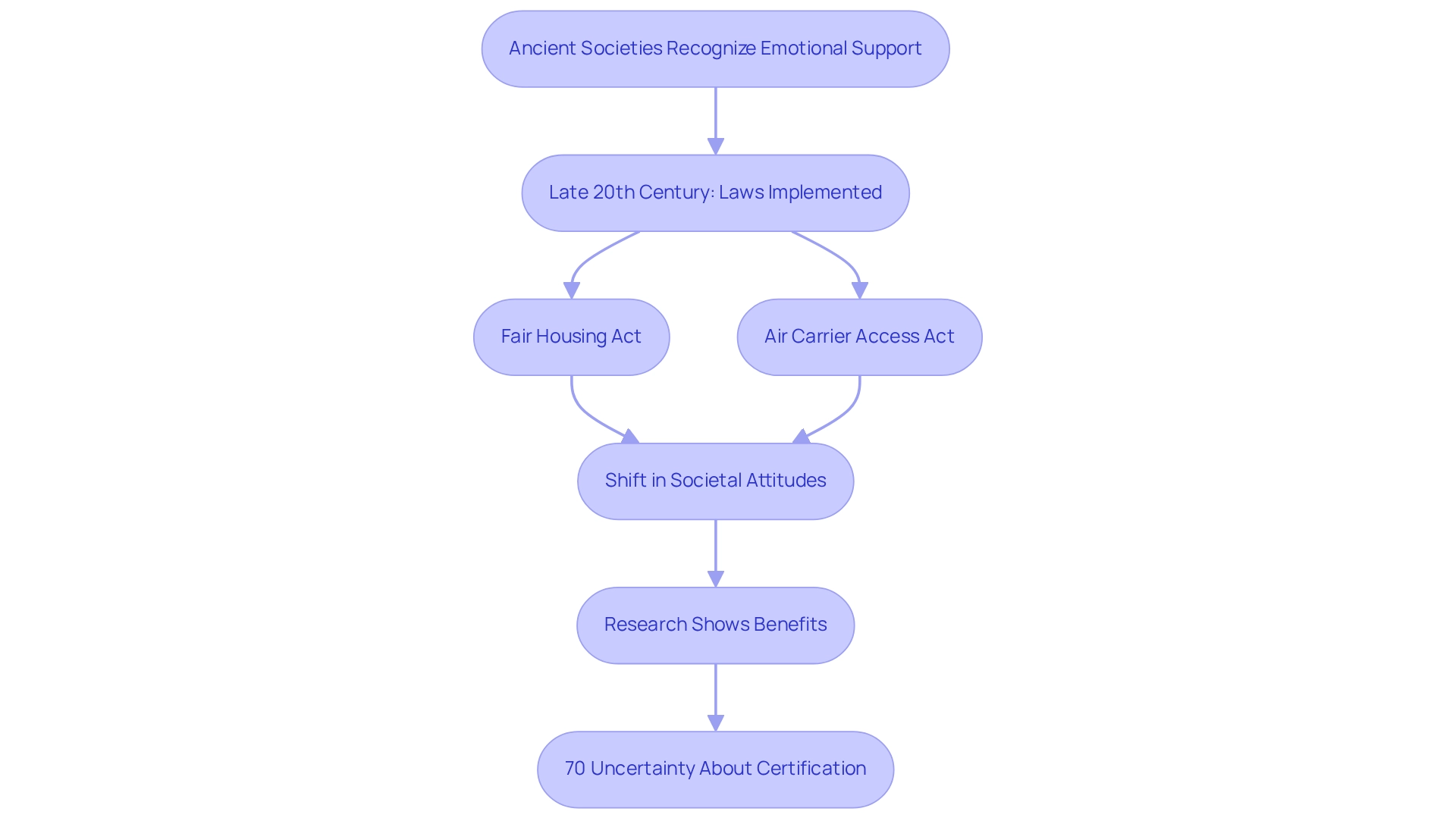

Emotional Pet Support: Definition, Context, and Key Benefits
by Lena Park
Last updated: July 8, 2025
Verified and Approved by:
Angela Morris,
MSW, LCSW
Fact Checked

Overview
Emotional pet support embodies the therapeutic benefits that animals offer to individuals grappling with mental health challenges. These beloved companions provide comfort and stability, helping to alleviate symptoms of anxiety, depression, and PTSD. Many pet owners report feeling substantial emotional relief from their animals, highlighting the growing recognition of emotional support animals as essential components in holistic mental health care.
As we navigate these emotional landscapes, it’s crucial to acknowledge the struggles faced by those with mental health issues. The presence of an emotional support animal can be a beacon of hope, offering not just companionship but also a profound sense of stability. An ESA letter serves as a compassionate solution, validating the importance of this bond and ensuring that individuals can access the support they need.
In a world where emotional challenges can feel overwhelming, the love and loyalty of an ESA can make a significant difference. Remember, you are not alone in this journey; support is available, and there are avenues to explore that can lead to healing and comfort.
Introduction
In a world where mental health challenges are increasingly prevalent, many individuals find themselves navigating emotional turmoil. It’s important to recognize the weight of these struggles, as they can feel isolating and overwhelming. Emotional support animals (ESAs) have emerged as vital companions, offering not just comfort but also stability to those in need. These remarkable animals provide companionship that goes beyond the ordinary; they play a significant role in alleviating symptoms of anxiety, depression, and PTSD, making them essential to holistic mental health care. As you reflect on your own experiences, consider how an ESA could bring solace and support into your life.
With a growing body of research supporting their benefits, understanding the unique characteristics and legal distinctions of ESAs is crucial. As society increasingly acknowledges the therapeutic power of these animals, the conversation around emotional pet support continues to evolve. This dialogue sheds light on their profound impact on mental well-being, offering hope and reassurance to those who may feel lost in their journey. Remember, you are not alone, and there are supportive solutions available, like ESA letters, that can help you navigate these challenges with greater ease.
Define Emotional Pet Support
Support from pets encompasses the therapeutic advantages that animals, particularly through emotional pet support, provide to individuals grappling with mental health challenges. These beloved companions offer comfort, companionship, and a sense of psychological stability, significantly alleviating symptoms associated with anxiety, depression, and PTSD. Remarkably, research reveals that 73% of participants own a pet, underscoring the widespread recognition of the benefits these animals can bring into our lives. Unlike service animals, which are specifically trained to perform tasks for individuals with disabilities, emotional pet support animals primarily offer emotional support simply through their presence, making them invaluable for those seeking relief from emotional distress.
The impact of emotional support animals is profound; for instance, 15.1% of participants in a study reported that their support dog provided substantial relief that went beyond mere companionship. This highlights the essential role that emotional pet support animals play in enhancing mental well-being. Experts suggest that for low-income or vulnerable populations, emotional pet support can serve as a lifeline, easing feelings of loneliness and anxiety. Wellness Wag offers an affordable and straightforward process for obtaining ESA letters, starting at just $32.25, with interest-free payment plans available. Alisha Eskay, a customer service representative, shares, “There are easy ways for people to get ESA certification letters, and you can find out if you qualify for one by taking our ESA letter quiz online.” Furthermore, sharing pet stories on social media, as recommended by the American Psychiatric Association, can promote mental health awareness and highlight the importance of therapy animals in therapeutic environments.
Real-life examples illustrate the benefits of assistance animals, with many individuals reporting improved mental stability and a greater sense of community. Understanding the distinction between emotional support animals and service dogs is crucial, as it clarifies their legal rights and their roles in providing emotional pet support in mental health. Service dogs often have higher success rates in completing specific tasks compared to comfort animals, which primarily provide emotional support. While there is no legal obligation for service dogs to be certified or registered, obtaining certification can lend credibility and ensure that the service dog meets certain standards. This distinction is further emphasized in the case study titled ‘The Distinction Between ESAs and Service Dogs,’ which underscores the importance of recognizing the different roles these animals fulfill. Ultimately, therapy animals offer invaluable support, nurturing psychological resilience and enhancing the quality of life for those in need.
Contextualize Emotional Pet Support in Mental Health
The significance of pet companionship is increasingly recognized within the mental health community, particularly as mental health challenges become more widespread. Many individuals face emotional struggles that can feel overwhelming. Engaging with therapy animals has been shown to alleviate anxiety, uplift mood, and promote overall wellness. Mental health professionals often advocate for the inclusion of emotional pet support in comprehensive treatment plans, recognizing their unique ability to provide comfort and psychological stability during difficult times. This growing trend underscores a broader movement toward holistic mental health approaches, where emotional pet support is recognized as a vital component of psychological support.
As Jonalyn Dionio aptly stated, “Therapy dogs have become valuable in schools and universities,” emphasizing their therapeutic advantages in educational environments. This brings hope to those who may feel isolated in their struggles. Additionally, Wellness Wag facilitates a streamlined assessment process for individuals eager to qualify for an ESA. Many clients have shared their uplifting experiences, expressing sentiments like, “The approval process for my ESA was easy and hassle-free” and “Thanks to Wellness Wag, I received approval for my ESA quickly and without any difficulties.”
To begin, clients complete a brief evaluation to identify their psychological support needs, followed by a personalized consultation with a licensed physician to determine their eligibility for an ESA. This reflects Wellness Wag’s dedication to making the process accessible and efficient, ensuring that individuals receive the support they deserve. As awareness of these benefits expands, the role of emotional pet support in mental health treatment continues to gain legitimacy, fostering a more inclusive understanding of mental health care. Remember, you are not alone in this journey, and support is available to help you thrive.
Trace the Origins of Emotional Pet Support
The utilization of creatures for emotional pet support has profound historical origins, tracing back to ancient societies that recognized the comfort and stability provided by companionship with these beings. However, it wasn’t until the late 20th century that the official acknowledgment of therapeutic creatures began to gain momentum, particularly with the implementation of the Fair Housing Act and the Air Carrier Access Act. These landmark laws established the rights of individuals with disabilities to have their emotional support creatures accompany them in housing and travel situations, mandating that landlords permit such companions. This marked a significant shift in societal attitudes towards support through animals.
Many individuals face emotional challenges that can feel overwhelming. Research has consistently demonstrated the psychological benefits of companionship, contributing to the growing acceptance of emotional pet support within therapeutic frameworks. For instance, a study of 1,500 ESA owners revealed that most are aged between 25 and 44, with a notable representation of females, highlighting the diverse demographics of those who seek companionship through pets. Yet, despite the clear advantages of having an ESA, a significant 70% of pet owners expressed uncertainty about the certification process. This indicates a critical gap in awareness and accessibility that needs to be addressed.
This uncertainty underscores the importance of improving education and resources about ESA certification, especially as service dogs undergo rigorous training through specialized programs to assist individuals with disabilities. It’s essential to understand that service dogs are trained to perform specific duties related to their handler’s disability, which is a significant difference from emotional support animals. As mental health continues to be a central theme in national conversations, the significance of emotional pet support animals is expected to grow. The demand for assistance animals is projected to increase by 20% annually, reflecting a rising recognition of their role in enhancing mental well-being.
Additionally, pet ownership during the COVID-19 pandemic has been associated with improved mental health among partnered individuals, further emphasizing the relevance of ESAs in contemporary mental health care. Today, emotional pet support is recognized as an essential part of comprehensive mental health care, providing individuals the companionship needed to navigate their mental difficulties. At Wellness Wag, we are committed to empowering individuals through accessible Emotional Support Companion Letters. We believe that everyone should have the opportunity to benefit from the transformative companionship of these remarkable creatures.

Identify Key Characteristics and Benefits of Emotional Pet Support
Effective support animals often exhibit a calm demeanor, sociability, and an innate ability to provide unconditional love and companionship. These qualities create a safe and comforting environment for their owners, significantly enhancing emotional well-being. Many individuals face emotional challenges, such as feelings of loneliness and anxiety, and research indicates that emotional pet support can help alleviate these feelings and improve overall mental health. For example, Wellness Wag serves over 50,000 patients who frequently report heightened feelings of security and reduced isolation—contributing to better mental health outcomes.
The presence of an emotional pet support animal can also encourage social interaction and engagement, assisting individuals who struggle with social anxiety or depression in cultivating a sense of community and belonging. As Laura Curtis, a mental health expert at the Worcester Recovery Center in Massachusetts, notes, these creatures can play a vital role in the recovery process. It’s important to recognize that while emotional support animals are not trained in the same manner as service pets, they are permitted in university accommodations to promote equal opportunities for students with disabilities, ensuring they can fully experience residential life.
Students with emotional support animals are encouraged to communicate openly with housing authorities to understand their rights and responsibilities, including any necessary documentation and adherence to housing policies. Case studies, such as ‘Intuitive Help for Mental Health: Emotional Pet Support,’ highlight that although ESAs do not possess the same legal privileges as trained service animals, their comforting presence and intuitive nature are crucial in providing emotional support to individuals with psychiatric disorders. This support enables them to maintain daily activities and enhances their quality of life. Reflecting on these experiences can provide insight into the profound impact that ESAs have on emotional well-being.
Conclusion
Emotional support animals (ESAs) have become essential companions for those facing mental health challenges, offering not just comfort but also a profound sense of stability. Many individuals experience anxiety, depression, and PTSD, and the impact these animals have in alleviating such symptoms is truly significant. A large percentage of pet owners recognize the emotional benefits their animals provide, leading to an increasing acknowledgment and appreciation of the role of ESAs in mental health care.
The historical context surrounding ESAs reveals their growing acceptance within therapeutic frameworks. This acceptance has been bolstered by legal rights that allow these animals to accompany their owners in various settings. As our society evolves in its understanding of mental health, the therapeutic power of ESAs is gaining wider recognition. The streamlined processes for obtaining ESA letters, exemplified by organizations like Wellness Wag, reflect a commitment to making emotional support accessible for those who need it most.
The defining characteristics of effective ESAs—calmness, sociability, and an innate ability to provide unconditional love—underscore their invaluable role for individuals seeking emotional relief. Ongoing research continues to highlight their benefits, emphasizing the importance of ESAs as a vital component of comprehensive mental health care. In a world where emotional struggles can often feel isolating, ESAs serve as a beacon of hope, reminding individuals that they are not alone on their journey toward mental wellness.
Frequently Asked Questions
What is emotional pet support and how does it benefit individuals with mental health challenges?
Emotional pet support refers to the therapeutic advantages that animals provide, particularly in offering comfort, companionship, and psychological stability to individuals dealing with mental health issues like anxiety, depression, and PTSD.
How prevalent is pet ownership among individuals seeking emotional support?
Research indicates that 73% of participants own a pet, highlighting the widespread recognition of the benefits that pets can bring to mental well-being.
What is the difference between emotional support animals and service animals?
Emotional support animals primarily provide emotional support through their presence, while service animals are specifically trained to perform tasks for individuals with disabilities.
What percentage of participants reported significant relief from their support dogs?
In a study, 15.1% of participants reported that their support dog provided substantial relief that went beyond mere companionship.
How can emotional pet support impact low-income or vulnerable populations?
Emotional pet support can serve as a lifeline for low-income or vulnerable populations by easing feelings of loneliness and anxiety.
What is the process for obtaining an ESA letter through Wellness Wag?
Wellness Wag offers an affordable process for obtaining ESA letters starting at $32.25, with interest-free payment plans available. Individuals can also take an online quiz to determine if they qualify for an ESA letter.
How can sharing pet stories on social media contribute to mental health awareness?
Sharing pet stories on social media, as recommended by the American Psychiatric Association, can promote mental health awareness and highlight the importance of therapy animals in therapeutic environments.
What are the legal rights and roles of emotional support animals compared to service dogs?
Understanding the distinction between emotional support animals and service dogs is crucial, as it clarifies their legal rights and roles. Service dogs often have higher success rates in completing specific tasks compared to comfort animals, which mainly provide emotional support.
Is there a legal obligation for service dogs to be certified or registered?
There is no legal obligation for service dogs to be certified or registered, but obtaining certification can lend credibility and ensure that the service dog meets certain standards.
What overall impact do therapy animals have on individuals’ mental health?
Therapy animals provide invaluable support, nurturing psychological resilience and enhancing the quality of life for those in need.
Certify Your Emotional Support Animal Today

Why You Can Rely on Us?
At Wellness Wag, we believe your pet deserves care rooted in both science and compassion. Each article is carefully researched, written in clear language for pet owners, and then reviewed by qualified professionals to ensure the information is evidence-based, current, and practical for real-life care. Our goal is to help you feel confident in making informed decisions about your pet’s health and well-being.
Reviewed by
Angela Morris, MSW, LCSW
Angela is a licensed clinical social worker with 20 years of experience in patient advocacy and community mental health. She has assisted numerous clients with ESA evaluations and brings a deep understanding of disability accommodations, ensuring that all information is accurate, supportive, and practical.

Written by :
Lena Park
Last Updated :
July 8, 2025












